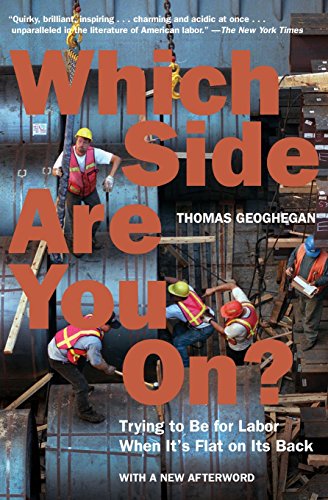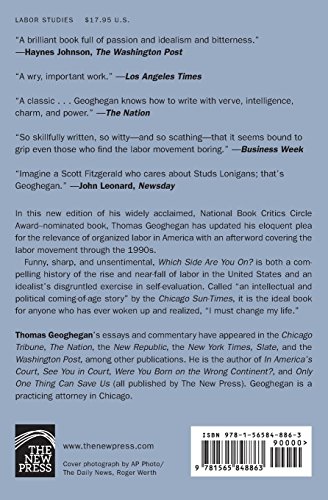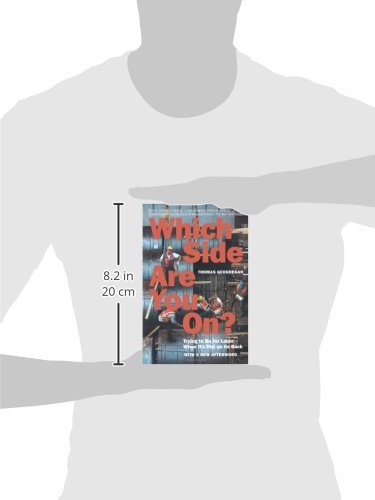Some deliveries may take a little longer than usual due to regional shipping conditions.
Customer Services
Copyright © 2025 Desertcart Holdings Limited




Full description not available
D**S
Informative and entertaining
I just finished this book and really enjoyed it. I am a law student who is very interested in labor law and this book provided me with a good overview of labor history and a realistic perspective on the fight that labor faces going forward. It also does all of that in an entertaining way. The author is very honest, which of course is necessary if a book is going to hold anyone's attention. The book is not a "rah rah labor" book. The author is not shy about showing how labor is sometimes its own worst enemy and the outlook isn't exactly bright. But, like MLK said, the truth shall set you free and anything worth having is worth fighting for. Read this book and get the scoop on labor in America.
S**K
Great Yet Depressing Read
As other reviewers have noted, this is easily the most comprehensive and insightful contemporary book on the state of organized labor in the US. Geoghegan is a master of prose and a brilliant story teller, guiding the reader through both complex legal thought and ever more complex labor relations analysis. As an aspiring labor attorney myself, I feel that the book was a necessary, albeit incredibly depressing, read. I recommend it to anyone who is wondering why, in a country with such a vast amount of wealth and resources, there is 10% unemployment and a fifth of the population on food stamps.
H**T
A Complete Waste of Time
I cannot believe I read the same book as all these other reviewers. I found it boring, poorly written & lacking in any inspiration.With friends like Tom Geoghegan, the union movement was bound to fail. Why this self-doubting guy should have become a labor lawyer is a complete mystery. He exhibits the same obsession with self that characterizes American culture. How can a collective organization, like a union flourish in a country where everyone, including most senior union executives, are only in it for themselves.The American workers have been screwed royally (especially by the anti-union Wagner Act) by the aggressive sociopaths who are attracted to the obscene rewards of reaching senior management positions in American corporations.The 66 page new afterword (added in 2004) is a complete waste of time, while the overall book is not worth anyone's time reading at all.
J**J
number one
I am sure that the book was very accurate and well written- but I never went beyond the second page.NLRB that is the apriori! How different from the British political apriori of bringing in the opposition-not into Kindle US Power Adapter (Not included with Kindle or Kindle Touch) the economic competition of funding political candidates but into Parliament.
D**S
Outstanding! The present day situation with organized labor id ...
Outstanding! The present day situation with organized labor id depressing. This book proves to you how depressing it really is.
E**Y
Great Book
If you are a long suffering fan of labor, this book's for you. Really well written and engaging account from a lawyer on the front lines of the labor movement.
D**E
Five Stars
Great Book
S**L
The decline of unions was not inevitable, and it can be reversed
You know how some people say, "I don't believe in religion, but I believe in God"? Thomas Geoghegan doesn't necessarily believe in labor unions, but he believes in labor. Or maybe: he doesn't believe ultimate salvation is to be found in unions, but that there's no alternative to them for now, and that without them we're ... well, we're in the state we're in today, where workers are powerless and can be left unemployed and uninsured at any moment. A world without unions is a world where we're scared.This is just not the world we ought to be living in. There is a better way and a better world, of course. We know that we can't get to this world on our own. On our own, we are isolated from the rest of those who are suffering. We are powerless so long as we are isolated.It's virtually an axiom, then, that some form of collective resistance to limitlessly powerful corporations is necessary. We simply cannot do it on our own. It does not follow, however, that labor unions are the ideal form of that resistance. It also doesn't follow that government is the ideal form. But in their highly imperfect way, says Thomas Geoghegan, labor unions are far better than a world without them. He backs this up with story upon story about corporations absolutely crushing workers in the absence of any labor-union resistance.Geoghegan himself is a labor lawyer who's been fighting the fight alongside labor unions for a quarter century or more. He's also often worked against them: he's sued the Teamsters repeatedly, in essence fighting for more union democracy. He's trying to get the unions that the employees deserve.He's not had much luck fighting against them. For a short time, Geoghegan's heart leapt for joy when Ron Carey was at the Teamsters' helm, but the Carey era ended quickly enough and James P. Hoffa (son of Jimmy Hoffa) took over.As for fighting alongside them, that hasn't worked very well either. Unions are down to 10% or so of the working population. Not coincidentally (as any reader of Paul Krugman knows well), the Democratic party is in a shambles and has been for at least thirty years. The Democrats need the unions.What makes this book so agonizing is Geoghegan's insistence that a few little changes would bring democracy to the unions, unions to the workers, and the Democratic party to power. One such change is a card-check system like the one Canada uses. Consequently, Canadian union membership has been consistently in the 30% range for at least a decade. When we dream of the better world that Canadians seem to inhabit, it's well to consider how they got there.The fact that just over the border is a country not much different than ours, but whose policies could hardly be more different, gives the lie to the notion that unions have disappeared in the U.S. because of changing workplaces. Yes, we're now a service economy rather than an industrial economy. But so is Canada. Geoghegan dispenses with any number of commonplaces like this one.In general, he spends the most time dismantling the idea that unions' disappearance is in some sense "natural." It's not. It has a lot to do with Republicans and with conservative courts. It has to do with Taft-Hartley. It has to do with one law after another that smashed unions into the ground. There was nothing natural about it.This book doesn't give much in the way of solutions, but I'm not even sure that's its point. Merely getting people -- especially Democrats -- to recognize a problem is plenty. Getting them to recognize a human-created problem is better still. Along the way, Geoghegan is impossibly funny, chatty, and self-deprecating. While I can't quite call this book a "joy" -- it's too maddening for that -- I do submit that it's indispensible and should be on every American's bookshelf.
A**I
Five Stars
Thank you
Trustpilot
2 months ago
1 month ago